
‘US not to benefit from nuclear adventurism’
Press TV has interviewed Professor Nader Bagherzadeh from Irvine to further discuss the interim nuclear deal reached between Tehran and six wold powers.
- Professor, why is it that Washington practically is disturbing the situation?
- I think that there is some concerns about what would happen to the final discussion, final agreement. I think you mentioned in your program the position that had been made by the Iranian officials is that we will not dismantle any of the equipments, perhaps even the Arak facility will go on and Dr. Salehi has made some comments recently that has made it to the news organizations item to report.
So there are discussions that are the two sides very far apart? And I think that there are some concerns about, again, what has been said about the news that the French have taken flights to Tehran to start the negotiations and start new joint projects. So that might be a combination of these concerns but the good part is that Senator Mendez, as you may have reported in your program, has decided to pause and not push for the sanctions, so that is really good for Mr. Obama’s administration to see what will happen.
- And what do you think the consequences would be if Washington continues with this political adventurism?
- I think that there would be a problem in the end that maybe we do not see anything past the six months agreement and I think this will not be a good thing in terms of what are the processes that have to be done to solve this issue diplomatically.
Any adventurism will result in non-diplomatic solutions which is not good for either side, it is not good for region and if you recall Dr. Salehi has said yesterday that we even try to allay your concerns about the Arak nuclear power plant which is the heavy water power plant, and I think that there are some issues that they can do that reduces the concern and also what has to be reminded that there is no reprocessing in Iran, so none of that potentially dangerous plutonium can be extracted like it was done in India or Pakistan is doing and Israeli did it 56 years ago.
So there should be no concern and Dr. Salehi also mentioned that it takes four to five years for anything to be done because there is another year and a half of construction, the fuel has to be tested and then there would be another year or so for the fuel to cool down if anybody wants to do anything dangerous and take the plutonium out, if there is a reprocessing facility in Iran which does not exist. So it is four to five years, [and] should not be a concern anyway in the near term.
Newsfeed
Videos






























